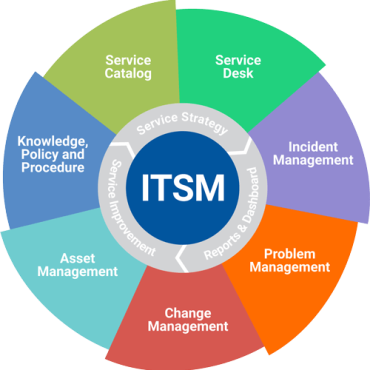

Introduction
ITSM (IT Service Management) Services that Help to Grow Your Business
ITSM (IT Service Management) is a ITIL framework and a set of predefined rules, best practices, and procedures that organization adopt to improve their IT services to end-users, to insure and adhere that they align with an organization’s key business goals and provide great value to customers. Some of the main tasks of ITSM is optimizing IT processes, maintaining service availability, and enhancing the customer experience.
Process of ITSM
IT service management covers a whole range of processes and continually improves in various areas. Following the ITIL framework, these processes are typically categorized under five stages: Service Strategy, Service Design, Service Transition, Service Operation, and Continual Service Improvement. Let’s look at some of the core processes that come under these categories.
Lets Work
The Secret of getting on top of search results
Local SEO
Link building
e-commerce SEO
We Service
Get on the first page of google through SEO!
Keyword Planning
Content Marketing
Site Audit
Competitive Analysis
Website Optimization
Onpage Optimization
Offpage Optimization
Link Building
Technical SEO
Result Analysis
Service Request Management
Service request management is the effective handling of incoming customer service requests for new services – whether that’s access to new service delivery, information, or equipment. These can include setting up a work account, issuing a new laptop, or sending guidelines on how to use the company’s online workspace.
Knowledge Management
Knowledge management oversees the creation, organization, usage, and distribution of knowledge across the organization. Having the right knowledge can make or break a company. Successful knowledge management means that valuable information is properly managed and easily accessible to the right people across the organization.
IT Asset Management
IT asset management ensures all your organization’s assets are accounted for. This includes software systems, hardware, and other IT-related resources used to carry out a business’ daily operations. Every IT asset has a shelf life, so to fully maximize the value you get out of them, a proactive approach in how you manage, maintain, and dispose of these assets is necessary.
Incident Management
Incident management is the process used for handling unplanned interruptions to services and restoring them to be operational again. An incident can come from anywhere, at any time. Successful incident management means being able to prioritize the most urgent incidents, communicate to key stakeholders, and resolve them quickly, so things can get up and running as usual.
Problem Management
Problem management seeks to analyse the problems across the organization’s IT service infrastructure, to prevent incidents from happening in the first place. While incident management can be seen as the ‘firefighter’, problem management is the ‘fire safety officer’. It looks at the causes of incidents and fixes them.
Change Management
Change management is the set of actions taken to implement any transitions or transformations you make in your organization, ensuring they’re carried out successfully. Organizations worth their salt will continue to evolve, so businesses must assess what changes are necessary, how they’ll be implemented, and how they’ll be communicated to everyone.


